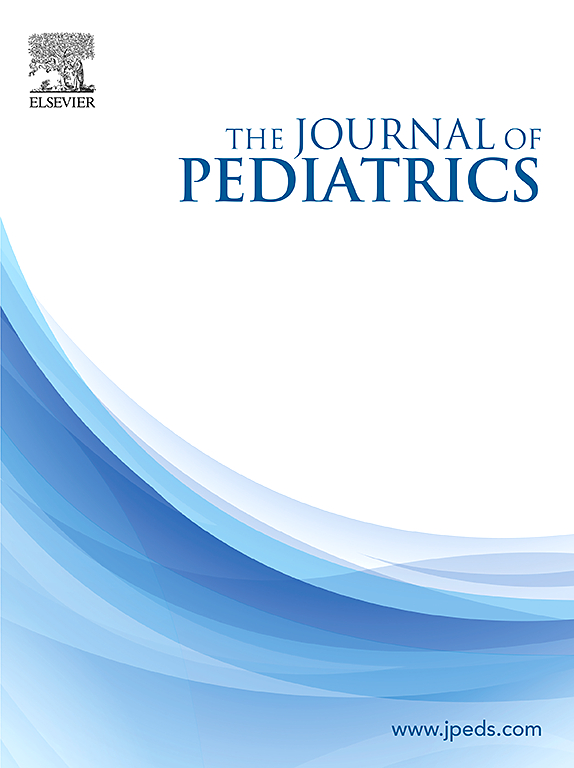Patent Ductus Arteriosus, Hydrocortisone, and Outcome among Infants Born Extremely Preterm: Secondary Analysis of the Hydrocortisone Trial
IF 3.9
2区 医学
Q1 PEDIATRICS
引用次数: 0
Abstract
Objective
To examine whether hydrocortisone (HC) modified the relationship of patent ductus arteriosus (PDA) to outcomes among infants born extremely preterm and enrolled in the National Institute of Child Health and Human Development Neonatal Research Network (NRN) HC trial.
Study design
This was a posthoc secondary analysis of infants born <30 weeks’ gestation and enrolled in the NRN HC Trial. The primary outcome was moderate to severe bronchopulmonary dysplasia (BPD) or death. Secondary outcomes included moderate to severe BPD, death, necrotizing enterocolitis, late-onset sepsis, days of mechanical ventilation, oxygen supplementation, Z-scores for growth, home oxygen, BPD severity, neurodevelopmental impairment, and moderate to severe cerebral palsy. Analyses for interaction between PDA (defined as treatment to achieve PDA closure) and HC were performed for the primary and secondary outcomes.
Results
Of 800 infants enrolled in the NRN HC trial, PDA was treated in 198 HC treated and 197 placebo-treated infants. HC did not modify the relationship of PDA with BPD or death (P = .93). Regardless of HC treatment, PDA was associated with a significant increase in duration of ventilatory support, oxygen supplementation at 36 weeks postmenstrual age (PMA), BPD severity, decreased weight-for-age Z-score at 36 weeks PMA, moderate to severe BPD, or death at 36 weeks PMA and home oxygen support.
Conclusions
HC after the second postnatal week did not alter the relationship between PDA and BPD or death among infants born extremely preterm. PDA was associated with several adverse outcomes regardless of HC treatment.
极度早产婴儿的动脉导管未闭、氢化可的松和结局:氢化可的松试验的二次分析。
目的:探讨氢化可的松(HC)是否改变了NICHD新生儿研究网络(NRN) HC试验中极早产儿动脉导管未闭(PDA)与结局的关系。研究设计:这是一项对妊娠< 30周的婴儿进行的事后二级分析,这些婴儿参加了NRN HC试验。主要结局为中度至重度支气管肺发育不良(BPD)或死亡。次要结局包括中度至重度BPD、死亡、坏死性小肠结肠炎(NEC)、晚发性败血症(LOS)、机械通气天数、补氧、生长z评分、家庭氧气、BPD严重程度、神经发育障碍(NDI)和中度至重度脑瘫(CP)。分析PDA(定义为实现PDA闭合的治疗)和HC之间的相互作用,并对主要和次要结果进行分析。结果:在参加NRN HC试验的800名婴儿中,198名HC组婴儿和197名安慰剂组婴儿接受了PDA治疗。HC没有改变PDA与BPD或死亡的关系(p=0.93)。无论HC治疗如何,PDA与通气支持持续时间、经后36周(PMA)补氧时间、BPD严重程度、36周(PMA)体重年龄比z评分下降、中度至重度BPD或36周(PMA和家庭氧支持)死亡显著增加相关。结论:出生后第二周的HC没有改变极早产儿PDA与BPD或死亡之间的关系。无论HC治疗方式如何,PDA都与几种不良结果相关。
本文章由计算机程序翻译,如有差异,请以英文原文为准。
求助全文
约1分钟内获得全文
求助全文
来源期刊

Journal of Pediatrics
医学-小儿科
CiteScore
6.00
自引率
2.00%
发文量
696
审稿时长
31 days
期刊介绍:
The Journal of Pediatrics is an international peer-reviewed journal that advances pediatric research and serves as a practical guide for pediatricians who manage health and diagnose and treat disorders in infants, children, and adolescents. The Journal publishes original work based on standards of excellence and expert review. The Journal seeks to publish high quality original articles that are immediately applicable to practice (basic science, translational research, evidence-based medicine), brief clinical and laboratory case reports, medical progress, expert commentary, grand rounds, insightful editorials, “classic” physical examinations, and novel insights into clinical and academic pediatric medicine related to every aspect of child health. Published monthly since 1932, The Journal of Pediatrics continues to promote the latest developments in pediatric medicine, child health, policy, and advocacy.
Topics covered in The Journal of Pediatrics include, but are not limited to:
General Pediatrics
Pediatric Subspecialties
Adolescent Medicine
Allergy and Immunology
Cardiology
Critical Care Medicine
Developmental-Behavioral Medicine
Endocrinology
Gastroenterology
Hematology-Oncology
Infectious Diseases
Neonatal-Perinatal Medicine
Nephrology
Neurology
Emergency Medicine
Pulmonology
Rheumatology
Genetics
Ethics
Health Service Research
Pediatric Hospitalist Medicine.
 求助内容:
求助内容: 应助结果提醒方式:
应助结果提醒方式:


